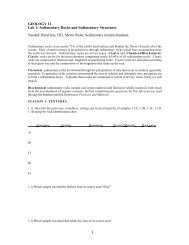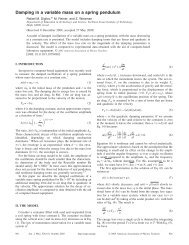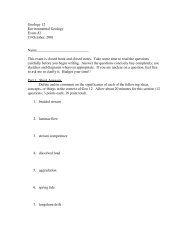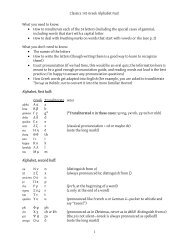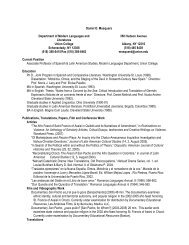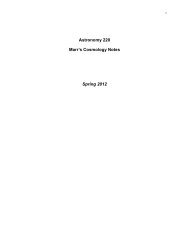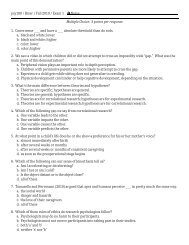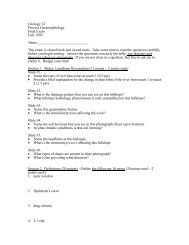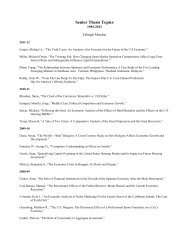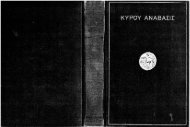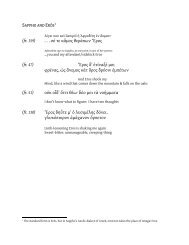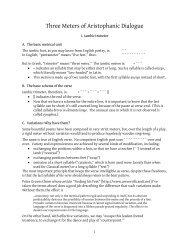Tarik Wareh Teaching Statement (Summer 2011) 1 ... - Union College
Tarik Wareh Teaching Statement (Summer 2011) 1 ... - Union College
Tarik Wareh Teaching Statement (Summer 2011) 1 ... - Union College
You also want an ePaper? Increase the reach of your titles
YUMPU automatically turns print PDFs into web optimized ePapers that Google loves.
<strong>Tarik</strong> <strong>Wareh</strong><br />
<strong>Teaching</strong> <strong>Statement</strong> (<strong>Summer</strong> <strong>2011</strong>)<br />
(Winter 2008) and comedy (Spring 2009) in translation, I have developed a plan to teach a new course<br />
on ancient drama in performance that will serve this audience and do justice to several of my principles<br />
and goals as a teacher. Previously, I have had students use in-class performances to spur debate about a<br />
text’s meanings and to highlight the difficulties and possibilities that open up when modern readers<br />
encounter ancient cultural artefacts. In the comedy course I took this a step further and had student<br />
groups completely modernize ancient scenes, not only shifting these texts’ obsessive interest in daily life<br />
into the students’ American world, but also identifying how ancient comic techniques could be applied<br />
to our own preoccupations, social tensions, etc. Though a small part of my previous courses, this<br />
assignment gave students a vantage point from which to consider their own cultural landscape: how do<br />
our own entertainments engage—or not engage—with the kinds of questions that excited ancient<br />
audiences? What does this say about our own social, political, and cultural identity?<br />
I anticipate several advantages that will make it worthwhile to develop a course more wholly<br />
oriented to performance questions. First, focusing on a single work and achieving the level of mastery<br />
necessary for a production will give students a motivation to achieve deeper expert knowledge about the<br />
ancient world and the literary practices of our dramatic texts. For example, in a survey course, we may<br />
speak only briefly about the nature of Aristophanes’ choral songs, but their poetic character and<br />
attitude to the audience will be a major topic in a performance-oriented course. Students will read<br />
related works but will have a more concrete mission in doing so: how do they illuminate the distinctive<br />
choices and possibilities of the main work to be produced in performance? While bringing students<br />
closer to ancient realities, this approach will also demand a more creative and committed discussion of<br />
the modern relevance of ancient works—how performers can communicate both the ancient dramas’<br />
cultural difference and distance, and its points of intersection with our own experiences. Finally, while<br />
the course will remain a Classics course graded by Classics standards (i.e., students are graded on the<br />
explanations, arguments, care, and thought that underlie their dramatic approach, not on their skill as<br />
performers), it offers an effective way to persuade a wide variety of students that learning and reflecting<br />
on other cultures can involve a lot more than simply reading books and writing papers. I hope that this<br />
will animate their approach to future courses and assignments, as well as shaping their lifelong learning.<br />
Finally, the class would have the opportunity to share with the whole campus community, in an<br />
amateur performance, the insights that have emerged from their deep engagement with the ancient<br />
material. This will make them accountable to a peer audience while enriching the quality of the<br />
campus’s learning environment.<br />
Similar principles are also applicable to larger courses. For example, in Spring 2012 I will teach<br />
World Mythology, which is likely to be one of the largest courses on campus, taught in an auditorium.<br />
Such large audiences are very challenging, and I have thought a lot based on earlier trial and error about<br />
the right approach. My conclusion is that I can do the most with my own strengths by clearly<br />
communicating to students that each 105-minute period will present them with three “pieces” for<br />
which I will hold them accountable: understanding a reading from an ancient text; understanding an<br />
event or tradition in the modern reception or performance of ancient myth; and understanding a “big<br />
idea” (myth as political propaganda; the common Indo-European inheritance of myths in different<br />
cultures; comic myths as questioning and reinforcing social norms; etc.). This approach is calculated,<br />
again, to get students deeply involved with ancient realities, while fully participating in questions of<br />
their modern relevance, and bringing in accessibly my own expertise on topics they would not be likely<br />
6



